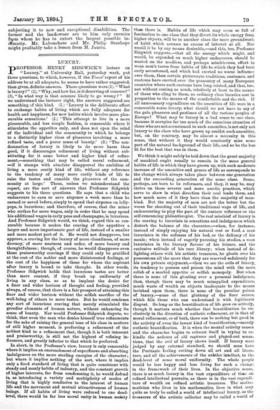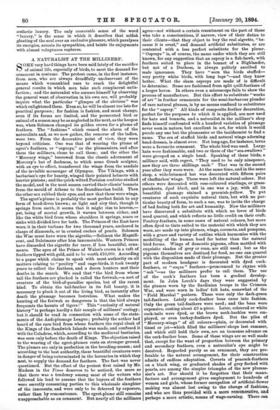LUXURY.
PROFESSOR HENRY SIDGWICK'S lecture on "Luxury," at University Hall, yesterday week, put three questions, to which, however, if the Times' report of his address be at all adequate, he seems to have rather suggested, than given, definite answers. These questions were (1), "What is luxury?" (2), "Why, and how far, is it deserving of censure?" (3), "In what way is that censure likely to go wrong ? " If we understand the lecturer right, the answers suggested are something of this kind. (1.) Luxury is the deliberate effort to exchange habits of living which are fully adequate for health and happiness, for new habits which involve more plea- surable sensations.' (2.) This attempt to live in a more pleasurable, and less simple fashion, is censurable where it stimulates the appetites only, and does not open the mind of the individual and the community to which he belongs to a distinctly higher class of pleasures involving a more refined taste, and a purer sense of beauty.' (3.) The con- demnation of luxury is likely to do more harm than good, if it discourages refinement of living without sub- stituting for it some better and higher kind of refine- ment, —something that may be called moral refinement, —if it stamps with absolute disapproval the ambition of living a more costly kind of life, without any reference to the tendency of many more costly kinds of life to raise the tastes and ennoble the pleasures of the com- munity at large.' These, unless we misunderstand the repert, are the sort of aiiswers that Professor Sidgwick suggests to his three questions. He says that a child who endeavours to earn or save sixpence a week more than he earned or saved before, simply to spend that sixpence on lolly- pops, is luxurious; and therefore, of course, that the miner who strikes for more wages, only in order that he may spend his additional wages in early peas and champagne, is luxurious. And Professor Sidgwick would, we think, regard this as cen- surable because it makes the craving of the appetites a larger and more importunate part of life, instead of a smaller and more modest part of it. He would not disapprove, but approve, a craving for the luxury of more cleanliness, of more decency,' of more neatness and order, of more beauty and thoughtfulness ; though, of course, he would disapprove even these praiseworthy cravings if they could only be gratified at the cost of the nobler and more disinterested feelings, at the cost of the happiness of those for whom the aspirant after luxury is bound to take thought. In other words, Professor Sidgwick holds that luxurious tastes are better than mere content, if they break up uniformity of living in any class, so as to implant the desire for a finer and wider horizon of thought and feeling, provided always, of course, that there is a fair prospect of attaining this finer and wider horizon without the selfish sacrifice of the well-being of others to mere tastes. But he would condemn any sort of luxurious craving that merely stimulated the greedier elements of human nature, without enhancing its
sense of beauty. Nor would Professor Sidgwick dispute, we think, that even the man who denies himself true refinements for the sake of raising the general tone of his class in matters of still higher moment, is preferring a refinement of the noblest kind to a refinement that, though it is both innocent and praiseworthy, is still not the highest of refining in- fluences, and greatly inferior to that which he preferred. In short, in the Professor's view, luxury is only censurable where it implies an encroachment of superfluous and absorbing indulgences on the more sterling energies of the character; but where it implies nothing of the sort, where it implies only a fixed standard of living that is quite consistent with steady and manly habits of industry, and the constant growth of higher interests, far from condemning it, he would defend is, as introducing a, variety and multiplicity of modes of living that is highly conducive to the interest of human life and the movement and mutual attractiveness of human beings. If all habits of living were reduced to one dead- level, there would be far less moral unity in haman society than there is. Habits of life which may seem so full of fascination to one class that they divert its whole energy from higher objects, will be to another class the mere groundwork of habit which arouses no excess of interest at all. Nor would it be by any means desirable,—and this, too, Professor Sidgwick suggests,—that all the energy which might, and would, be expended on much higher endeavours, should be wasted on the needless, and perhaps mischievous, effort to wean men's tastes from habits of life to which they had been early accustomed, and which had exerted no worse influence over them, than certain picturesque traditions, costumes, and customs have exerted over the peasantry of many European countries where such customs have long existed, and that, too, not without costing as much, relatively at least to the means of those who cling to them, as ordinary class luxuries cost in proportion to the means of the comfortable and the rich. If all unnecessary expenditure on the amenities of life were in a censurable sense luxury, what should we not have to say of the gala pleasures and pastimes of all the various peoples of Europe P What may be luxury in a bad sense to one class, because it occupies far too much of the conscious attention of those who are not accustomed to such amenities, is not only not luxury to the class who have grown up amidst such amenities, but, on the contrary, may be almost a necessity in this sense, that without it they would constantly miss some part of the natural background of their life, and so be the lees fit for the best that was in them.
We think it might safely be laid down that the great majority of mankind ought usually to remain in the same general habits of life in which they have grown up, with such moderate increase of the amenities and graces of life as corresponds to the change which always takes place between one generation and the succeeding generation of the same class. Some, perhaps, are born to be reformers, and they, it may be, may thrive on those severer and more ascetic practices, which serve to show in what direction their zeal leads them, and how much more of it they have than the majority of. man- kind. But the majority of men are not the better but the worse for shooting out of their traditional ways of life, and endeavouring to play the part of the austere reformer or the self-renouncing philanthropist. The real mischief of luxury is the craving to luxuriate in sensations and indulgences which disturb the balance of the character,—when, for instance, instead of simply enjoying his natural rest or food, a man luxuriates in the softness of his bed, or the delicacy of his meals; when instead of eagerly pursuing his studies, a man luxuriates in the literary flavour of his leisure, and the exclusive solitude of his rare library; when instead of de- lighting others with his artistic treasures, he gloats over his possessions all the more that they are reserved sedulously for his own private enjoyment, —then we see the evils of luxury, its tendency to possess and poison the mind with the mere relish of a morbid appetite or selfish monopoly. But when there is none of this gloating over a personal indulgence, then, though there may be much misapplied expenditure, much waste of wealth on objects inadequate to the means lavished upon them, there is none of the peculiar poison of luxury,—none of that gluttony of the finer senses, which fills those who can understand it with legitimate disgust. So long as the beautification of life goes on actively, though it matters much whether that beautification be ex- clusively in the direction of wsthetic refinement, or in that of moral refinement, or of both, there can be nothing but good in the activity of even the lowest kind of beautification,—merely wsthetic beautification. It is when the mental activity ceases and the character begins to exhaust itself in trying to re- kindle the ardours of old raptures and played-out sensa- tions, that the evil of luxury shows itself. If luxury were judged by any external standard, we should soon have the Puritanic feeling cutting down all art and all litera- ture, and all the achievements of the subtler intellect, to the dead-level of some moral uniformity. The whole people would be less happy and less living for such a change in the framework of their lives. In the objective sense, there is as much luxury in the vast expenditure of time on refined intellectual pursuits, as there is in the vast expendi- ture of wealth on refined artistic treasures. The mathe- matician who lives in his mathematics, lives in what may quite as truly be called a world of intellectual luxury, as the treasures of the artistic collector may be called a world of aesthetic luxury. The only censurable sense of the word "luxury," is the sense in which it describes that selfish gloating of the soul over an exclusive pleasure, which paralyses its energies, arrests its sympathies, and taints its enjoyments with almost voluptuous raptures.



































 Previous page
Previous page